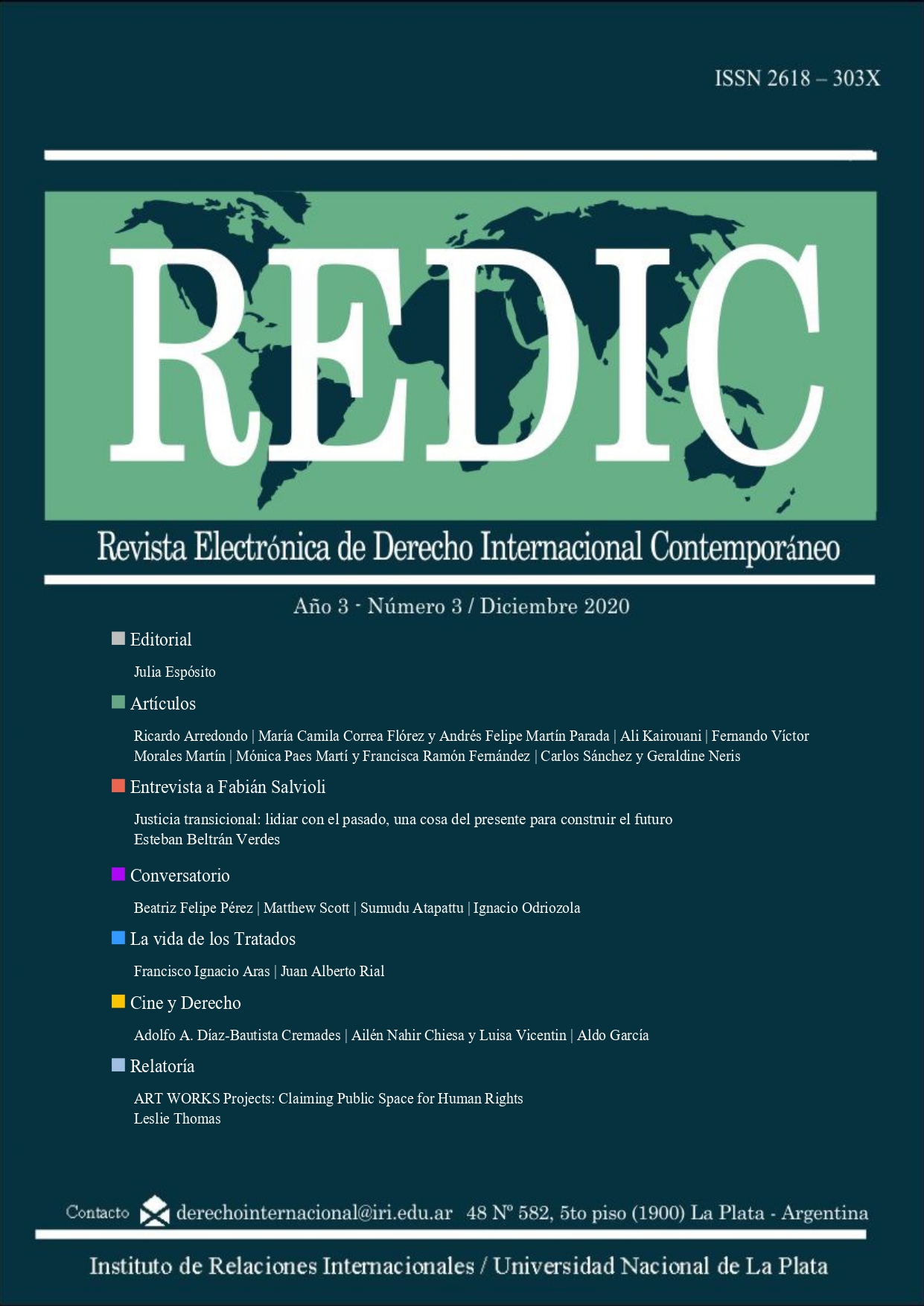Sobre el desplazamiento por cambio climático y su regulación en el Derecho Internacional
DOI:
https://doi.org/10.24215/2618303Xe007Palabras clave:
cambio climático, desplazamiento, principio de non refoulementResumen
“Conversar” es la acción de hablar con una o varias personas. En esta sección nos proponemos que especialistas dialoguen por escrito sobre uno de los temas actuales del Derecho internacional: el desplazamiento por cambio climático que afecta a miles de personas en todo el mundo y el vacío normativo en el reconocimiento de la protección de estos desplazados, lo que a su vez genera un debate sobre si considerarlos como migrantes o refugiados. En esta oportunidad invitamos a Josefina Buscetti quien planteó a los especialistas el siguiente interrogante: el Comité de Derechos Humanos de las Naciones Unidas, a principios del año 2020, en su opinión al caso sobre la deportación a la República de Kiribati de Ioane Teitiota quién había solicitado asilo bajo los términos de “refugiado” o “persona protegida” en Nueva Zelanda, concluyó que los desplazados como consecuencia del cambio climático no deben ser devueltos a su país de origen si sus derechos humanos fundamentales como el derecho a la vida, se encuentran en riesgo a causa de este retorno, marcando de esta manera un precedente a nivel global, por lo tanto, ¿cómo considera que debe plantearse la normativa internacional para que en su aplicación los Estados tengan la obligación de reconocer y proteger a los desplazados transfronterizos por cambio climático que solicitan asilo? A continuación compartimos las opiniones de los especialistas sobre la cuestión planteada.
Descargas
Citas
Doyle, T. & Chaturvedi, S. (2018). Climate Refugees and Security: Conceptualizations, Categories, and Contestations. En J.S. Dryzek, R.B. Norgaard, and D. Schlosberg (eds), The Oxford Handbook of Climate Change and Security (pp. 279-292) Oxford University Press.
Eckersley, R. (2015). The common but differentiated responsibilities of states to assist and receive ‘climate refugees.’ European Journal of Political Theory 14(4), 481-500.
Ioane Teitiota v. New Zealand (advance unedited version), CCPR/C/127/D/2728/2016, UN Human Rights Committee (HRC), 7 January 2020, para 8.5, available at: http://blogs2.law.columbia.edu/climate-change-litigation/wp-content/uploads/sites/16/non-us-case-documents/2020/20200107_CCPRC127D27282016-_opinion.pdf
Lister, M. (2014). Climate change refugees. Critical Review of International Social and Political Philosophy 17(5), 618-634.
McAdam, J. (2007). Complementary Protection in International Refugee Law. OUP.
Ödalen, J. (2014). Underwater Self-determination: Sea-level Rise and Deterritorialized Small Island States. Ethics, Policy & Environment, 17(2), 225-237.
Scott, M. (2020). Climate Change, Disasters, and the Refugee Convention. Cambridge University Press.
Sinclair-Blakemore, A. (2020). Teitiota v New Zealand: A Step Forward in the Protection of Climate Refugees under International Human Rights Law?, 28 January 2020, Oxford Human Rights Hub https://ohrh.law.ox.ac.uk/teitiota-v-new-zealand-a-step-forward-in-the-protection-of-climate-refugees-under-international-human-rights-law/
UNHCR, Advisory Opinion, on the Extraterritorial Application of Non-Refoulement Obligations under the 1951 Convention relating to the Status of Refugees and its 1967 Protocol, 26 January 2007, available at: https://www.unhcr.org/4d9486929.pdf
Wewerinke, M. (2013). A Right to Enjoy Culture in Face of Climate Change: Implications for Climate Migrants. CGHR Working Paper 6 | 4CMR Working Paper 7. Cambridge: University of Cambridge Centre of Governance and Human Rights, 3-15.
Yamamoto, L & Esteban, M. (2010). Vanishing Island States and sovereignty. Ocean and Coastal Management, 53 (1), 1-9.
Descargas
Publicado
Cómo citar
Número
Sección
Licencia
Aquellos autores/as que tengan publicaciones con esta revista, aceptan los términos siguientes:
- Los autores/as conservarán sus derechos de autor y garantizarán a la revista el derecho de primera publicación de su obra, el cuál estará simultáneamente sujeto a la Licencia de reconocimiento de Creative Commons (BY-NC-SA) 4.0 que permite a terceros compartir la obra siempre que se indique su autor y su primera publicación esta revista, no se haga uso comercial, y si se remezcla, se transforma o se crea a partir del material, se debe distribuir bajo la misma licencia del original.
- Los autores/as podrán adoptar otros acuerdos de licencia no exclusiva de distribución de la versión de la obra publicada (p. ej.: depositarla en un archivo telemático institucional o publicarla en un volumen monográfico) siempre que se indique la publicación inicial en esta revista.
- Se permite y recomienda a los autores/as difundir su obra a través de Internet (p. ej.: en archivos telemáticos institucionales o en su página web) antes y durante el proceso de envío, lo cual puede producir intercambios interesantes y aumentar las citas de la obra publicada. (Véase El efecto del acceso abierto).































